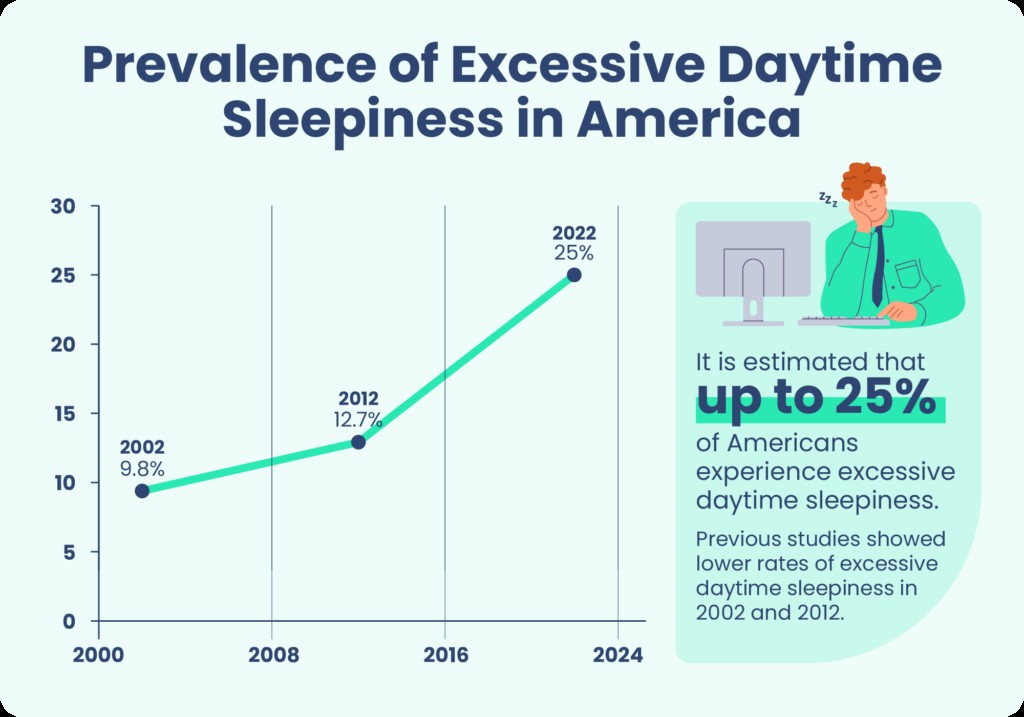Feeling like you’re constantly fighting to keep your eyes open? You’re not alone. Many people struggle with excessive daytime sleepiness, also known as EDS. It’s more than just feeling a little tired; it’s a persistent struggle to stay awake and alert during the day, often leading to unwanted naps and decreased performance in daily activities. If you’re frequently asking yourself, “why can’t I stay awake?”, it’s important to understand that this isn’t normal and often signals an underlying issue that needs attention.
What is Excessive Daytime Sleepiness?
Excessive daytime sleepiness (EDS) isn’t a condition itself, but rather a significant symptom indicating a deeper problem or a combination of contributing factors. Experts in sleep medicine define it as a persistent difficulty in maintaining wakefulness and alertness throughout the day. Individuals experiencing EDS often feel an overwhelming urge to sleep during typical waking hours, even when they should be active and engaged. It’s crucial to distinguish EDS from simple fatigue. While fatigue is characterized by feelings of physical and mental exhaustion, EDS is specifically about the struggle to stay awake. However, these two can sometimes overlap.
Recent studies highlight that excessive sleepiness is a widespread issue, affecting as much as 25% of the population. While varying definitions of EDS make precise measurements challenging, it’s clear that the problem has become more prevalent in recent years. Understanding the potential reasons “why can’t I stay awake?” is the first step towards finding effective solutions and reclaiming your daytime alertness.
Common Reasons Why You Can’t Stay Awake
If you’re constantly battling sleepiness during the day, several factors could be at play. The most common culprits fall into a few key categories:
Sleep Deprivation: The Number One Cause
Lack of sufficient sleep is widely recognized as the most frequent reason behind excessive sleepiness. When you consistently don’t get enough sleep, your body and mind simply can’t function optimally during waking hours. Sleep deprivation can be short-term, like after a few nights of poor sleep, or chronic, resulting from ongoing insufficient sleep over weeks, months, or even years. Modern lifestyles, work demands, and personal choices often contribute to sleep deprivation, making it a leading factor in why many people struggle to stay awake.
Sleep Disorders: Disrupting Restorative Sleep
Various sleep disorders can significantly impact the quality and quantity of your sleep, leading directly to daytime drowsiness. Conditions like insomnia, sleep apnea, narcolepsy, and restless legs syndrome disrupt your sleep cycles, preventing you from getting the restorative rest you need.
- Insomnia: Characterized by difficulty falling asleep, staying asleep, or both, insomnia results in reduced total sleep time and poor sleep quality.
- Sleep Apnea: This disorder causes repeated pauses in breathing during sleep, fragmenting sleep and reducing oxygen levels. Obstructive sleep apnea is the most common type.
- Narcolepsy: A neurological disorder that affects the brain’s ability to regulate sleep-wake cycles, leading to overwhelming daytime sleepiness and sudden sleep attacks.
- Restless Legs Syndrome (RLS): RLS causes an irresistible urge to move the legs, often accompanied by uncomfortable sensations, which can disrupt sleep onset and maintenance.
If you suspect a sleep disorder might be the reason “why can’t I stay awake”, seeking professional diagnosis and treatment is crucial.
Underlying Medical Conditions: Health Issues and Sleepiness
Certain medical conditions can directly contribute to sleep problems and excessive daytime drowsiness. Various health issues can disrupt normal bodily functions, impacting sleep regulation and wakefulness.
- Metabolic Problems: Conditions like diabetes and hypothyroidism can increase the risk of daytime sleepiness. Fluctuations in blood sugar levels or thyroid hormone imbalances can affect energy levels and sleep patterns.
- Anemia: Iron deficiency anemia can lead to fatigue and sleepiness due to reduced oxygen transport in the blood.
- Electrolyte Imbalances: Abnormal blood sodium levels and other electrolyte imbalances can also provoke excessive sleepiness by disrupting nerve and muscle function.
- Mental Health Disorders: Depression and anxiety are strongly linked to sleep disturbances and daytime sleepiness. These conditions can affect sleep quality and duration, leading to feelings of being constantly tired and unable to stay awake.
- Neurodegenerative Diseases: Conditions like Parkinson’s disease and Alzheimer’s disease can disrupt sleep-wake cycles and contribute to EDS.
- Neurodevelopmental Disorders: ADHD and autism spectrum disorder are also associated with sleep difficulties and increased daytime sleepiness.
Addressing these underlying medical conditions is often necessary to resolve the issue of excessive daytime sleepiness.
Medications: Side Effects that Cause Drowsiness
It’s important to consider medications as a potential cause if you’re wondering “why can’t I stay awake?”. Many medications, particularly sedatives, are designed to induce drowsiness, but their effects can linger into the daytime.
- Sedatives and Sleeping Pills: These medications directly promote sleepiness and can cause residual drowsiness the next day.
- Antidepressants: Some antidepressants have sedative properties and can cause daytime sleepiness as a side effect.
- Pain Medications: Opioid pain relievers and certain other pain medications can also induce drowsiness.
- Over-the-Counter Antihistamines: Many antihistamines, especially first-generation types, are well-known for causing drowsiness and can significantly contribute to daytime sleepiness.
- Withdrawal from Drugs: Paradoxically, withdrawal from certain substances can also lead to drowsiness as the body readjusts.
If you suspect your medication might be causing your sleepiness, it’s essential to discuss it with your doctor. They can review your medications, adjust dosages, explore alternative medications, or advise on the timing of your doses to minimize daytime drowsiness. Never make changes to your medication regimen without consulting your healthcare provider.
Getting Relief When You Can’t Stay Awake
The good news is that relief is achievable for most individuals struggling with excessive sleepiness. The most effective treatment approach is personalized, targeting the specific underlying cause or contributing factors identified by a healthcare professional.
Since EDS can stem from poor sleep habits, medical conditions, or brain-related issues, treatment strategies are diverse. Consulting a doctor is the most crucial step to accurately diagnose the cause of your daytime sleepiness and develop a tailored treatment plan.
If sleep deprivation is the root cause, improving sleep quality and quantity is paramount. This might involve:
- Improving Sleep Hygiene: Establishing a regular sleep schedule, creating a comfortable sleep environment, and practicing relaxing bedtime routines.
- Addressing Sleep Disorders: Treatments like continuous positive airway pressure (CPAP) therapy for sleep apnea or cognitive behavioral therapy for insomnia (CBT-I) can be highly effective.
- Optimizing Sleep Environment: Ensuring you have a supportive mattress and pillow that contribute to comfortable and restful sleep.
When EDS is linked to an underlying medical condition, treatment will primarily focus on managing or resolving that condition. Alongside medical treatment, improvements to sleep hygiene and incorporating healthy sleep habits into your daily routine are often recommended to support overall sleep health and reduce daytime sleepiness.
If you’re consistently asking yourself, “why can’t I stay awake?”, don’t dismiss it. Take the first step, consult with a healthcare professional, and start your journey towards feeling more alert and energized during the day.

